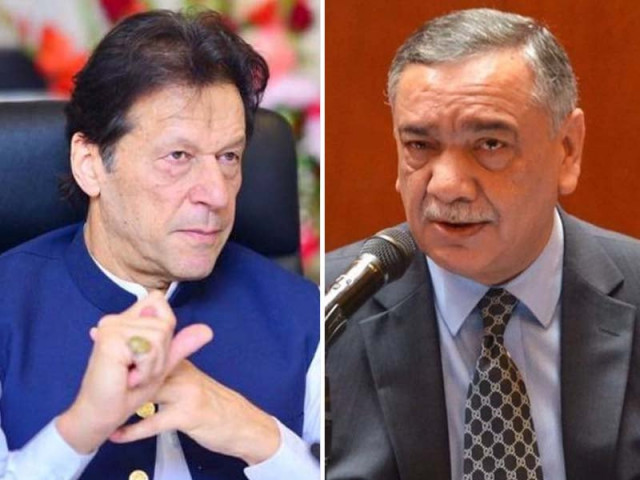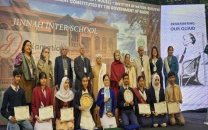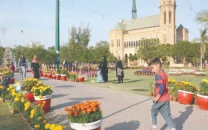Imran Khan believes in rule of law, supremacy of Constitution: PM's aide
Firdous also criticises opposition's attempts to 'influence' ECP proceedings in PTI foreign funding case

Prime Minister Imran Khan and Chief Justice of Pakistan Justice Asif Saeed Khosa. PHOTO: FILE
This was stated by the PM's special assistant, Firdous Ashiq Awan, on Thursday morning, a day after the premier was publicly rebuked by Chief Justice of Pakistan Justice Asif Saeed Khosa for his recent not-so-veiled criticism of the judiciary.
In a series of tweets, Firdous said the entire nation was aware of who the Supreme Court had declared 'sadiq' and 'ameen' and who was found to be dishonest and unfit for public office.
She also criticised the opposition for "trying to influence" the Election Commission of Pakistan (ECP) and its proceedings in the case regarding foreign funding of the ruling Pakistan Tehreek-e-Insaf (PTI).
"The PTI stands firm on its assertions. Unlike others, we will face these proceedings and not try to evade accountability," she tweeted.
CJP Khosa asks PM Imran not to ‘taunt’ the judiciary
The special assistant's remarks on the supremacy of law would likely be viewed as an attempt to smooth over matters following CJP Khosa's strong statements on Wednesday.
Addressing a ceremony at the Supreme Court, Justice Khosa delivered a scathing rejoinder advising Imran Khan not to "taunt the judiciary" in any way.
The prime minister is visibly unhappy with the Lahore High Court (LHC), which earlier this week overruled a government condition for former premier Nawaz Sharif to submit a multibillion-rupee indemnity bond for permission to fly abroad for medical treatment.
And the premier appealed to the CJP Khosa and his successor on Monday to "restore" the public’s trust in the judiciary.
"I do not want to comment on the particular case [of Nawaz Sharif], which the prime minister had referred to but he [PM] will be aware that he himself gave [Nawaz] permission to go abroad.
"That’s why he should refrain from making such statements. No one is perfect. We are changing. Don’t compare us with the judiciary which had existed before 2009," said Justice Khosa, who is set to retire next month.
Talking with reference to the LHC order, Justice Khosa said: "There was only discussion on modalities of the matter [Nawaz Sharif’s exit] before the LHC. Don’t taunt us about powerful people as no one is powerful before the court. Only the law is powerful."
He said the judiciary is independent as a result of the 2009 lawyers’ movement, and working in accordance with the law and the Constitution.
He reminded that the post-2009 judiciary was the one which had convicted one prime minster [Yousuf Raza Gilani] and disqualified another [Nawaz Sharif] and was soon going to decide the high treason case against a former army chief [General Pervez Musharraf].
PM Imran stops PTI govt spokespersons from commenting on CJP Khosa's remarks
After the CJP's address, PM Imran issued instructions to all government spokespersons to refrain from responding to Justice Khosa's remarks.
Presiding over a meeting of government spokespersons at the PM Office, the premier maintained that the Sharif family stood unmasked in front of the nation.
"The whole nation is watching. Nawaz Sharif's sons who received him [in London] are absconders in Pakistan. He [Nawaz] couldn't even prove the ownership of the flat he is living in there," said Imran.
"The government allowed Nawaz to leave in light of his medical reports and on humanitarian grounds," he added.
The prime minister reiterated that the government accepted the court's decision to allow the ailing Sharif family patriarch to fly abroad without submitting an indemnity bond to the interior ministry.
PM Imran pledged no let-up in his anti-graft drive, saying that he would continue his fight against the "corruption mafia" even if he had to do it alone.
"The government will not create any hurdles in the accountability process. I strongly believe in accountability and nobody involved in corruption should be spared, whether they are part of the opposition or the government."
The prime minister said the National Accountability Bureau (NAB) was an independent institution and could hold anyone accountable. "Whoever has looted the nation’s wealth should be taken to the task regardless of who they are and NAB should carry out across-the-board accountability."



















COMMENTS
Comments are moderated and generally will be posted if they are on-topic and not abusive.
For more information, please see our Comments FAQ